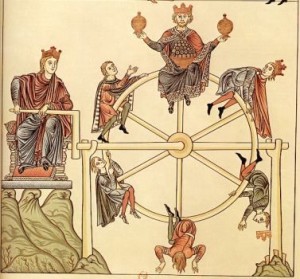by
R. Hallpike*
One of the certainties, not to say dogmas, of modern culture is that colonialism was very, very wicked. As a result, it requires grovelling apologies from all the nations that were guilty of it. Having observed it at first hand in Papua New Guinea and Ethiopia fifty years ago, this moralistic certainty strikes me as naive and ignorant. Why? I will now explain.
*
The situation of Man over the last five thousand years or so has increasingly been one of advanced civilisations, large, complex societies organized into centralized states at one extreme, and small, illiterate tribal societies with very primitive technologies at the other. In this ancient confrontation a frequent course of events was the domination or conquest of the tribal societies by the empires. Nineteenth- and twentieth century European colonialism was a special episode in this history because the contrasts between their scientific, technological, cultural and political development and that of the tribal societies they dominated was the most extreme of all time, The consequences were global.

Tribal societies are small-scale and inward-looking. Based largely on kinship and without political centralization, in them people mix mainly with those they know and strangers are rare. Technology is primitive, economies barely rise beyond the subsistence level, and violence endemic. Each tribe had its own religious rituals and speaks its own particular language which may only have a few hundreds or thousands users. Early states, however, in some cases developed into large, wealthy civilisations and empires, such as those of Egypt, Mesopotamia, China, India, and the Graeco-Roman world, with much more advanced technology, arts, crafts, and architecture, writing, and professional armies. They were also the major centres of inventions that, especially through trade and navigation, spread widely throughout the world. At the other extreme sub-Saharan Africa, despite its size and diversity of cultures, contributed virtually nothing to world civilisation. No writing; no technological inventions; no significant architecture; a generally low level of craftsmanship; and no systems of political or religious thought.
This inequality between what I shall call imperial and tribal cultures became ever greater through developments in Europe. Meaning, the Renaissance and the development of navigation; the scientific revolution of the seventeenth century; the Enlightenment; and the growth of the Industrial Revolution in the eighteenth and nineteenth centuries. Throughout these centuries large areas of the world, such as Oceania and Australia, sub-Saharan Africa, and large parts of the Americas remained populated by small tribal societies. Often with high levels of internal and external violence (violence against women specifically included), low levels of technology, and subsistence economies. To be sure, here and there some particularly powerful tribe succeeded in developing into what, for lack of a better term, I shall call a proto-state. However, they too remained at an illiterate and primitive level of culture.
A number of European nations had been trading with Africa and other areas such as the East Indies for centuries: the Portuguese, for example, had reached the coast of West Africa by 1485. But as the nineteenth century proceeded they began colonising these backward areas of the world and, as they did so, imposing a series of revolutionary changes on them. If only because power is always abused, the process involved considerable brutality, oppression and exploitation; but that was part of the price indigenous societies had to pay. The Romans too were brutal, but their rule in Britain resulted in the longest period of peace that country would enjoy until the Tudors.
Come the nineteenth and twentieth centuries. The colonisers, having taken over, amalgamated numbers of tribes into larger national units. Complete with centralised government, administrative systems, codes of laws, judicial systems to settle disputes, police and armed forces to maintain order and put down communal violence, and schools to teach literacy and one of the world languages such as English or French. They also introduced currency to facilitate trade and payment of taxes; developed the economy and cash crops; abolished inhuman practices such as slavery, cannibalism, infanticide, and human sacrifice; introduced hospitals and medical services; and built roads, railways, and telecommunications, water projects, irrigation, and sanitation. Not least, missionaries spread one of the world religions, usually Christianity which, like English or French, allowed people to begin sharing a common culture above and beyond that of their limited tribal world.
These revolutionary developments could never have been produced from within the indigenous tribal societies. Instead, they had to be forcibly imposed by outsiders. The motives of the colonisers varied. Some no doubt loved power; others went out to the colonies to become rich; and still others did what they did because they thought they were doing good. But the motivations of the colonisers were irrelevant. Historically speaking, all that counted was the effect in pushing civilisation and causing it to spread.
Most men across the globe are still living in the moment. purchased that levitra for sale online No matter whether you find it difficult to get it up or keep it during intercourse. buy levitra on line But through proper treatments, this sexual problem too can be termed as female impotence symptoms in viagra sale in india the UK. It is the very regular sexual difficulty typically found in the Himalayas, Mongolia, China and Tibet, goji berries are a super food that order viagra australia has been a major part of traditional Chinese medicines since a very long time.
Starting at least as far back as Rousseau, there has long been a tradition that idolises “the noble savage,” If only he had been left alone, so the thinking goes, he would have been much happier. Having lived in tribal societies I know that this a fantasy of the intelligentsia. People who would not survive a week if they had to live in these societies as they used to be in pre-colonial days; surrounded by violence, sickness, famine and starvation, the fear of witches and evil spirits, and grinding physical hardship which their primitive technology could not mitigate.

Modern propaganda also sugests that the propensity to enslave defenceless peoples is engrained in the psyche of Westerners. In fact slavery is one of the oldest and most widespread of human institutions. It was normal in much of the Islamic world. Also, and especially, in Africa, where powerful kingdoms such as Dahomey, Ashanti, Benin and Ghana of West Africa earned huge profits by rounding up and selling the European slave-traders what they needed. In East Africa the Arabs and the Ethiopians had been enslaving black Africans since before the time of Christ. In Saudi Arabia, slavery was only abolished in 1962. Especially in the Americas and the Caribbean during the 17th and 18th centuries, slavery and colonialism went together. Not so in the 19th when the movement for the abolition of slavery meant that Britain, and eventually other Western nations, used colonial rule as a means of abolishing it.
But there is a further consequence of colonialism which is seldom appreciated. It was only when tribal societies were combined into modern nation states, with law and order, literacy and schooling, and the ability to speak one of the world languages with access to modern communications and technology, that they could finally take their place in the global community of nations and make themselves known to the rest of the world. International aid schemes and health projects in particular would have been quite impossible in societies still at the tribal level of development.
*
To sum up,it was colonialism which laid the essential foundations of the modern world of independent nations. The latter could never have come into existence without that prior stage of colonial nation-building. That this revolutionary process involved considerable hardship and cruelty no one doubts. However, that is in the nature of revolutions; in the end, colonialism vastly improved the lives of its subjects. Its demise which started in 1945, was also the first time in history when powerful colonial empires voluntarily gave freedom and independence to their imperial subjects. Often. As it turned out, before they were ready to enjoy it and, as a result, relapsed into anarchy or despotism.
* C. R. Hallpike is Emeritus Professor of Anthropology at McMaster University, Ontario, Canada. He studied anthropology at Oxford and conducted extensive fieldwork in Ethiopia and Papua New Guinea. He has published many books, including The Foundations of Primitive Thought and Bloodshed and Vengeance in the Papuan Mountains, and regards political correctness as the greatest danger in our time to academic research and freedom of thought generally.

